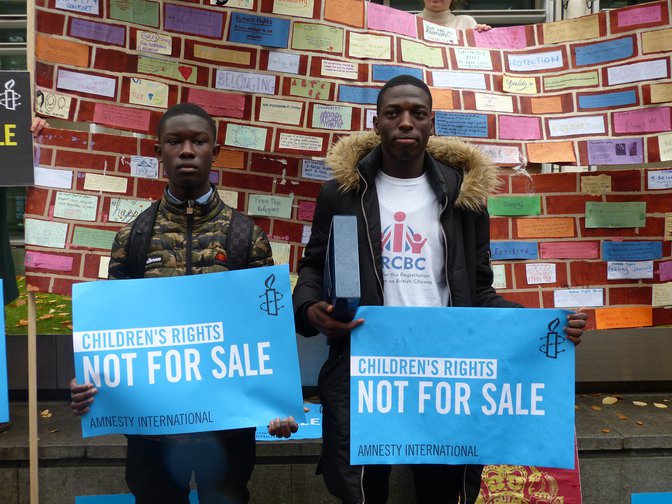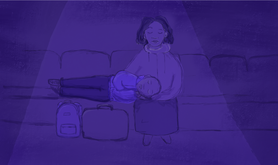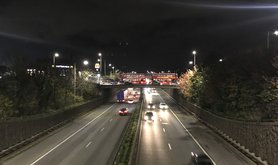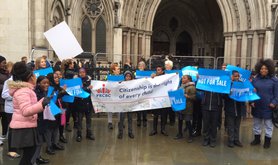
The children who can’t afford to be British
The Home Office charges £1,012 to children born in the UK who need to apply for British citizenship. The High Court recently found this to be unlawful but for these children, the story remains the same.


Daniel first noticed it when his friends started talking about the holidays they’d been on. It got worse when the school he was at began taking its pupils on trips abroad. Unlike his friends, Daniel, who is 13-years old, doesn’t have a passport, so even if his family could afford to go abroad, he wouldn’t be able to join them. Unlike his friends, Daniel isn’t a British citizen, even though he was born here and has never been anywhere else in his life.
“Because he isn’t a citizen he feels like an outsider”, says his father Femi (names have been changed), who came to this country from Nigeria almost 15 years ago, “there are discussions he can’t be involved in”.
Daniel is not an immigrant. He was born in the UK and because he has spent more than ten years in Britain he has the right to go through the registration process and become a British citizen. He loves playing football and his father says he likes the school he goes to in Wigan, where they live. That he isn’t already a British citizen is surprising to many.
The problem for Daniel, his family and many thousands of others living in low to middle income households is the £1012 fee the Home Office charges children to register as British citizens. The current administrative cost to the Home Office of processing a child’s registration fee is £372, leaving a £640 profit on each application. Despite being nothing to do with immigration, this money subsidises the immigration system.
We’ve got a newsletter for everyone
Whatever you’re interested in, there’s a free openDemocracy newsletter for you.
On 19 December, the High Court in London ruled that the £1012 fee was unlawful. The court found a “mass of evidence” showing that the fee charged by the Home Office prevents many children from registering British citizenship, leaving them feeling “alienated, excluded, second best, insecure and not fully assimilated into the culture and social fabric of the UK”. The Home Office have been given permission to appeal the decision.
"I feel as British as any of my friends and it’s not right that I am excluded from citizenship by a huge fee"
Reacting to the verdict, one of the claimants, a young person prevented from registering by the fee, said: “I was born in this country and have lived here all my life. I feel as British as any of my friends and it’s not right that I am excluded from citizenship by a huge fee.” The cost to applicants has been rising since 2011 and despite the ruling, the £1012 fee - which has been in place since 6 April 2018, remains, with a Home Office spokesman saying, “we note the court’s judgement and will consider its implications carefully.”
This feeling of exclusion – from the society you live in, from your friends, from the only place you have ever called home – is as familiar to 10-year old Emmanuel as it is to 13-year old Daniel. Like Femi, Emmanuel’s mother Motunrayo came to the UK from its former colony, Nigeria. She has been in Britain since 2009 and has the right to remain here. Emmanuel was born in England and has never been anywhere else in his life. He lives in Plumstead, south-east London, with his mother, his father, younger sister and younger brother.
Last October Motunrayo, who is 39-years old and works as an assistant in a nursery, completed the citizenship application for her oldest child. Her husband, who is 41-years old and works as a cleaner at a hospital, had to pay the £1012 fee on his credit card. The family wasn’t able to pay the fee with their own money and borrowed it from three separate friends, including a former landlord. They have not heard back from the Home Office about the application and do not know when they will be able to pay back the money they had to borrow.
Motunrayo says that she wanted to apply for citizenship for all three of her children but once she saw how high the fee was, she knew she would only be able to take on Emmanuel’s application. Like Daniel, Emmanuel became aware of his situation when friends at school started going on holidays and he realised he didn’t have a passport. “His friends had passports and he didn’t know why he didn’t have one”, Motunrayo says. “I had to tell him that he would probably get one by the time he was in secondary school”.
Like many parents in this situation, Motunrayo has been bewildered by the application process. “It’s very confusing and it has been very stressful. I’m now on medication for high blood pressure”, she says. Femi has been similarly affected by what he calls a “stagnant” situation. He is diabetic and has problems with his kidneys and liver. “I am sick”, he says, “I am not a happy person. The Home Office are doing this for psychological reasons. I don’t know why they are doing it”.
Daniel has also been “stuck in limbo for so long” and this, Femi says, has affected the 13-year old. Similarly, Emmanuel’s mother says that he is a “sensitive boy. I try not to discuss it with him too much and I try to carry the burden, which is why my health has suffered. We as immigrants already pay a lot of money to stay here but my children have never known anywhere else. It makes us feel very unwelcome and there are thousands of us in the same shoes, dying inside.”
British nationality law is not British immigration law, but their conflation has led to some profound injustices, most notably the Windrush scandal
The High Court ruling on 19 December provides some hope for families like these. The case was brought by the Project for the Registration of Children as British Citizens (PRCBC), which describes itself as the “first and only organisation to focus directly on children and young adults and their right to British citizenship” and supported by Amnesty International UK.
The case challenged the lawfulness of charging any fee where a child cannot afford it, as well as the lawfulness of the profit element in all cases. Impact assessments show that the Home Office has said before that those who benefit from the immigration system should pay for it and that the department’s ambition is to make the system self-financing. The flaw in this logic is that the fee also applies to those like Daniel and Emmanuel, who are applying for citizenship - their cases are nothing to do with the immigration system.
Solange Valdez-Symonds, director of PRCBC, and Steve Valdez-Symonds, of Amnesty UK, told openJustice that despite being two distinct things, nationality law and immigration law are treated as one and the same thing. British nationality law is not British immigration law, but their conflation has led to some profound injustices, most notably the Windrush scandal in which many thousands of people entitled to citizenship were instead left with an immigration status.
PRCBC is one of the only organisations that specialises in helping children like Daniel and Emmanual to register their citizenship. Steve Valdez-Symonds, who also volunteers at PRCBC, told us that Freedom of Information Act information shows there has been a significant increase in citizenship registration applications since PRCBC began, indicating that their everyday work is also having an impact. “Doing this work properly, with a strong foundation and knowing what needs to be done can have a dramatic affect on children exercising their rights” he told us.
In their work, both Solange and Steve have found that many people tend to assume that if you were born in Britain, you are British, which is not the case. This assumption - and the lack of distinction between nationality and immigration law – has already become an issue for EU citizens living in the United Kingdom as the country leaves the European Union.
As Steve Valdez-Symonds points out, some of these EU nationals are already British citizens or already have a right to British citizenship - they just don’t know it, and will face the same barriers to that citizenship, including the thousand pound fee. The settlement scheme, on the other hand, is free.
“Essentially, the government has managed to engineer a situation where there is a huge incentive for British kids to be treated not as if they are British but as if they are migrants, who should have an immigration status. Ironically, this is exactly the status the Windrush generation were left with… so when the government says it’s committed to ensuring that Windrush never happens again, actually it is doing precisely the same thing as we speak.”
The government has engineered a situation where there is a huge incentive for British kids to be treated as if they are not British, but migrants
Daniel and Emmanuel are far from the only children whose families are being ground down by the process of obtaining citizenship and the £1012 fee. Academic researchers have estimated that there are around 120,000 children in the UK without British citizenship and that about 65,000 of those were born in the UK.
Before the British Nationality Act 1981, anyone born in the UK was born British. The act ended this and so today, someone born in the UK is only a British citizen if one of their parents is a British citizen or one of their parents is settled in the UK (having settled status does not mean being a British citizen - it means that you have indefinite leave to remain in the country).
Being blocked from citizenship by the high Home Office fee opens up the possibility that these children will suffer the same fate as the Windrush generation, including being expelled from the United Kingdom, which is their home. This could happen, Solange and Steve Valdez-Symonds say, at any time in their lives. It could also leave them being excluded from any number of services and opportunities, from renting accommodation to receiving healthcare to accessing higher education.
There is, of course, a significant racial dimension to this, with British society still resistant to the idea that children of colour born and brought up in Britain, whose ancestors usually resided in British colonies and who may very well have suffered great injustices as a result, are just as British as their white counterparts.
In 1948, the British Nationality Act established the principle of “Civis Britannicus Sum”: that anyone born in the empire had the rights of British citizenship. As a result, the former subjects of the British Empire came to the motherland as supposedly equal citizens. In response to the racism they faced, the phrase “We are here because you were there” became a striking anti-racist slogan.
But from 1948 onwards, successive immigration acts have sought to curtail the rights of British nationals and to make it harder to become British. The Commonwealth Immigrants Act 1962 imposed tighter controls and was branded a piece of “cruel and brutal anti-colour legislation” by the then-Labour leader Hugh Gaitskell.
Today, in the wake of the Windrush scandal and ongoing questions about what will happen to EU nationals now that Brexit is to go ahead, the High Court’s ruling gives some hope to Daniel’s father, Femi.
“It sounds positive”, says Femi, who is also being represented by Solange Valdez-Symonds. “I felt hopeful when I heard the news that something could happen. My son was born here and he has always been here. I hope that this will be recognised.”
For more information on the High Court case and how it came about, tune into our podcast interview with Steve Valdez-Symonds which can be found here.
Read more
Get our weekly email




Comments
We encourage anyone to comment, please consult the oD commenting guidelines if you have any questions.